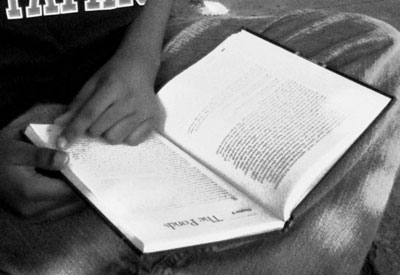All Nonfiction
- Bullying
- Books
- Academic
- Author Interviews
- Celebrity interviews
- College Articles
- College Essays
- Educator of the Year
- Heroes
- Interviews
- Memoir
- Personal Experience
- Sports
- Travel & Culture
All Opinions
- Bullying
- Current Events / Politics
- Discrimination
- Drugs / Alcohol / Smoking
- Entertainment / Celebrities
- Environment
- Love / Relationships
- Movies / Music / TV
- Pop Culture / Trends
- School / College
- Social Issues / Civics
- Spirituality / Religion
- Sports / Hobbies
All Hot Topics
- Bullying
- Community Service
- Environment
- Health
- Letters to the Editor
- Pride & Prejudice
- What Matters
- Back
Summer Guide
- Program Links
- Program Reviews
- Back
College Guide
- College Links
- College Reviews
- College Essays
- College Articles
- Back
Reading Between the Lines
A mediocre cabinet sat against the wall of my room, but its shelves housed a prized personal collection. Among these were encyclopedias, visual dictionaries, mystery novels, abridged versions of classics, and the familiar Magic Treehouse series. The contents of these shelves were the focus of my childhood and served, not to idly amuse, but to thoroughly engross and occupy me because of a love for reading. I found this small library to be so extensive that, whenever curiosity proposed a question, I would browse its vast knowledge until my interests were satisfied. The library also served as an extension of thought which widened my capacity for imagination. I was not limited to the confines of a room when I read, but overstepped these boundaries to produce vivid accounts from the plight of a madman in old St. Petersburg to the vitality of the Founding Fathers during the Revolutionary War. This exposure to reading was a major factor in cultivating my thinking.
My predisposition to reading was introduced to me at a young age. These were in the forms of subscriptions to science magazines. The perplexing diagrams caught my eye, and I found that reading the corresponding texts usually produced a revelation. This enlarged my curiosity as I realized that most of the answers to the universe, if not all, were easily accessible in these little blocks of text.
Entering grade school, I was introduced to a new style of reading which was reading between the lines. This was a necessary skill when studying literature. The answers were still in the text, but remained latent, concealed. It required more pondering and more thinking. On this level, a new element was the reader himself who deciphered the novel's intent.
My recent engagements with reading have been more personal, more intimate. Literature reveals herself in short, but meaningful glimpses. She likes to whisper insight whenever I listen. In Rudyard Kipling's "If," she becomes the epitome of resolve. In William Henley's "Invictus," she demonstrates what extreme conviction is. I carry these snippets daily, as comfort or strength at appropriate moments.
Even now, on this path in life, I am searching for answers. But like a great classic novel, the answers are not always apparent. Part of discerning is reading between the lines, and it is this thinking that has me convinced that life is composed of more than what is tangible.
Over the years, I have come across a variety of short stories, novels, and memoirs. Reading develops a sort of empathy for the situations and difficulties presented. I am concerned for the struggling protagonist, which has translated into a genuine concern for other people. I have also gained knowledge from reading science articles and textbooks. In the future, I wish to be a physician. I want to work in a field that helps others and applies the knowledge that has intrigued me many times in my youth.

Similar Articles
JOIN THE DISCUSSION
This article has 0 comments.
